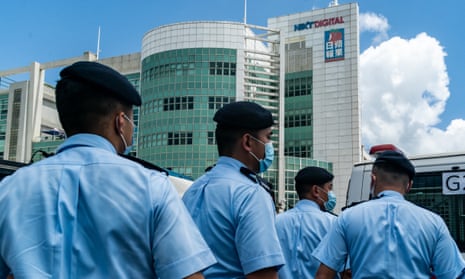Next Digital, a Hong Kong media group known for its criticism of Beijing, has filed for liquidation, with its board of directors resigning to help facilitate the process.
Owned by the jailed tycoon Jimmy Lai, the group was the publisher of Apple Daily, a popular pro-democracy newspaper that closed in June after its newsroom was raided by police investigating whether some articles breached a national security law introduced by China last year.
The company’s assets were frozen as part of the investigation and share trading was suspended on 17 June.
In a filing to the Hong Kong bourse late on Sunday, Next Digital said the best interests of shareholders, creditors, employees and other stakeholders would be served by an “orderly liquidation”.
Ip Yut Kin has tendered his resignation as a non-executive director and chairman. Louis Gordon Crovitz, Mark Lambert Clifford and Elic Lam have tendered their resignations as independent non-executive directors, the company said.
The company’s chief executive, Cheung Kim-hung, who was arrested at the time of the raid at the Apple Daily, and its chief financial officer, Hung Chi Keung, resigned in July.
Next Digital said in a statement: “We have concluded that the best interests of shareholders, creditors, employees and other stakeholders will be served by an orderly liquidation.”
It added that it hoped the resignations of the remaining board members would result in the Hong Kong government allowing liquidators to authorise payments the directors were banned from approving, including those to creditors and former staff.
The company said the Hong Kong government had never indicated which Apple Daily articles had allegedly violated the national security law. The uncertainty had created a climate of fear that had resulted in numerous resignations, including by those responsible for the regulatory compliance duties of the company, it said.
“We observe that the events affecting the company and its people following the invocation of the national security law occurred despite there having been no trials and no convictions,. Under this new law, a company can be forced into liquidation without the involvement of the courts,” the statement said.
“As Apple Daily often observed, Hong Kong people have a collective memory of what life was like elsewhere when freedom of speech was denied: no other rights are safe.”
Clifford told the New York Times on Sunday: “When you abuse state power and freeze bank accounts and throw people in jail – the editor in chief, the chief executive, the founder – it smacks of a banana republic.”
He added: “This is not what made Hong Kong a centre of international investment or the image that it prides itself in, with rule of law and protection of property rights.”
Critics of the national security law, which was introduced in June 2020, say it has been used to muzzle dissent in Hong Kong and erode fundamental freedoms, including those of the media, in the former British colony that returned to Chinese rule in 1997.
Authorities have denied this, but said acts that endangered China’s national security crossed a red line. Security officials have said law enforcement actions are based on evidence and have nothing to do with an individual’s background or profession.
Lai was sentenced to an extra 14 months in prison after his conviction for an unauthorised assembly in 2019 in May. He is expected to be tried this year on charges including those brought under the national security law.
